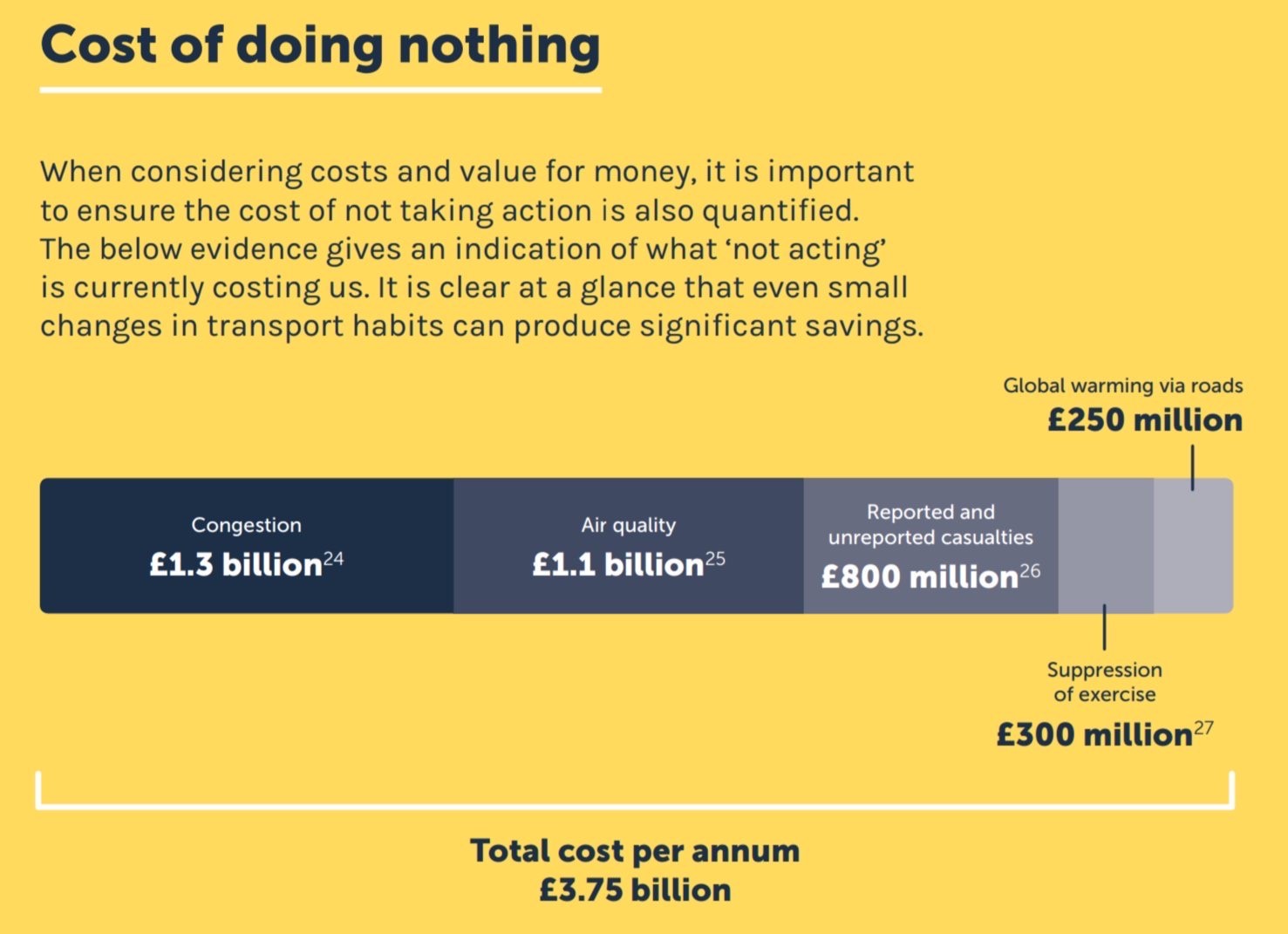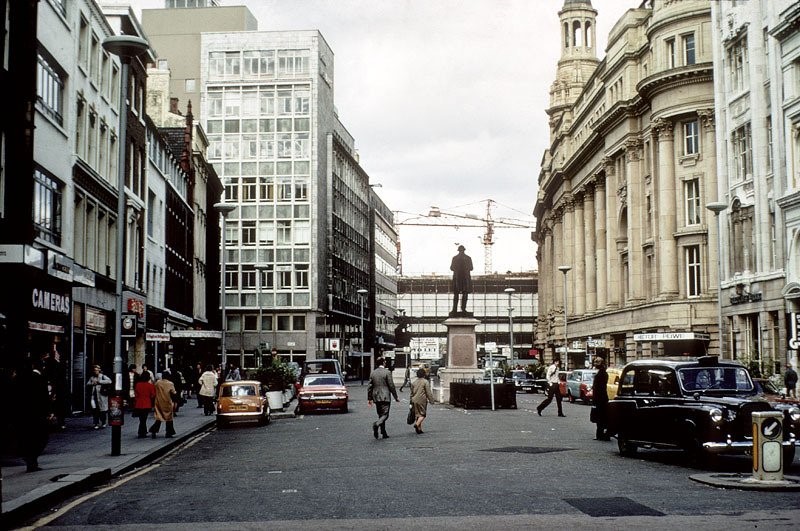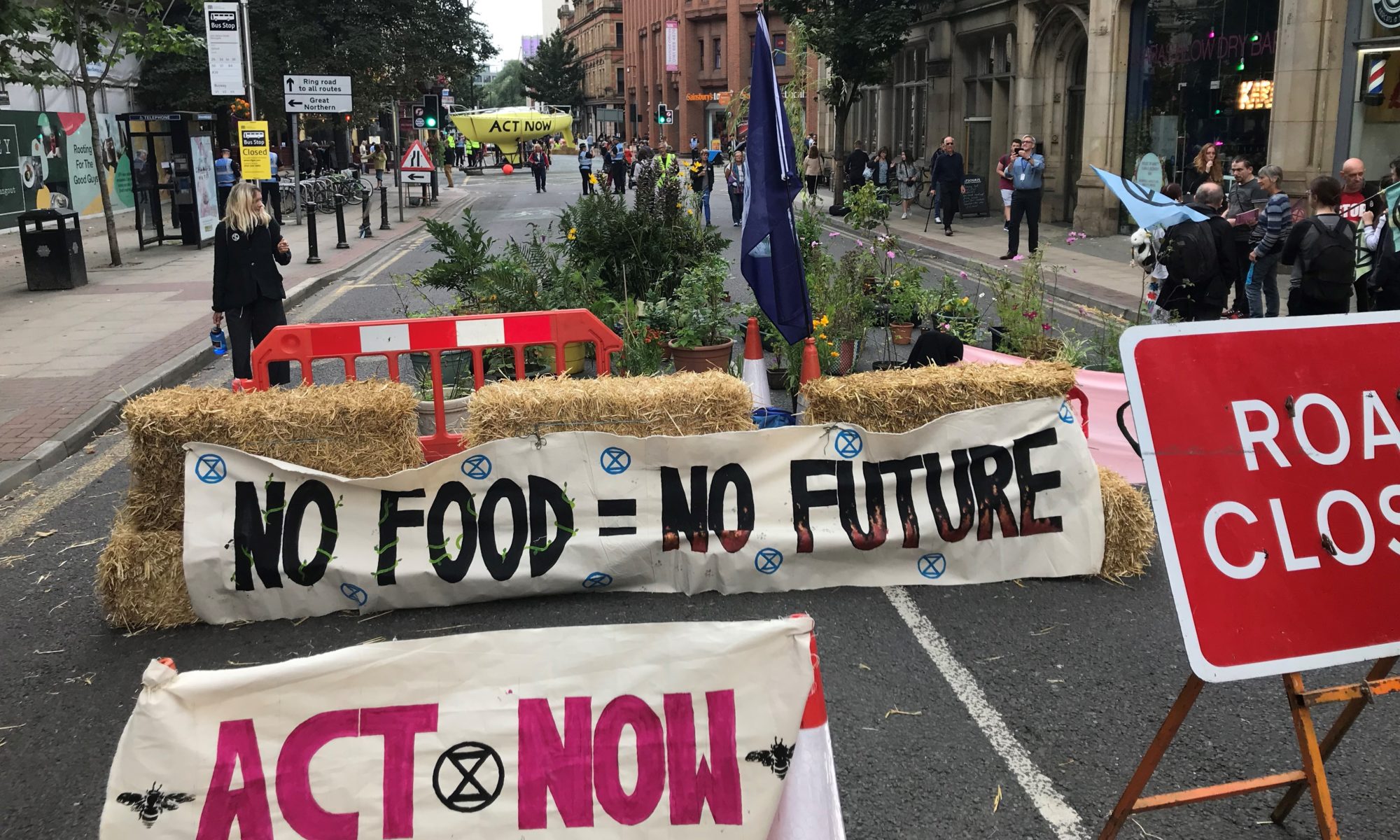On 8 July 2019, Manchester City Council declared a Climate Emergency and as a result a new committee has been tasked with scrutinising progress to the city’s carbon-zero 2038 target. Here’s what I learnt from attending the first meeting.
1. The new Climate Emergency Scrutiny committee means business.
It seemed clear that this group of seven councillors, chaired by Annette Wright, (Hulme councilor and co-author of the Climate Emergency motion) – seem genuinely set on examining and overhauling everything the council does to bring it in line with the emergency declaration. ‘We want to understand where we are now, where we need to get to, what we need to do to get there, how we’re doing along the way,’ said Wright {paraphrased}.
2. The current Climate Action Plan is not fit for purpose
The meeting spent almost two hours forensically going through each of the 20 points in the existing Manchester Climate Action Plan, thus exposing its inadequacy.
Currently – it’s an eclectic mix of actions, some specific and with carbon reductions attached (‘LED street lights = 8,000+ tonnes of Co2 saved’), some huge and broad (‘meeting our 2050 carbon-zero target’) and some vague with no clear outputs attached (‘participate in the Core Cities Adaptation project’), some covered by multiple points and possible double counting (eg emissions from council buildings covered by four separate points).

As Wright testily made the point again and again, the plan doesn’t contain a breakdown of segment targets, or how each of the 20 actions relate to the cuts we need to make – so there is no sense of where Manchester is on its journey to a carbon-zero future.
For instance – if transport accounts for 31% of Co2 in Manchester, what are the year by year reductions required, how will we make them, what progress are we making and who is accountable for reaching them?
It seemed surprising that after claiming to be a leader in this for so long (2009), this document is what underpins the city council’s climate action; let’s hope what comes next (to begin March 2020) is far better.
3. There are no council employees working full-time exclusively on the climate emergency.
‘It’s part of lots of people’s jobs, we want to weave it in every {role/department}. There is also a tremendous amount of enthusiasm,’ said Head of Policy David Houliston.
To be fair this will fail if left to a small ‘climate change cul de sac’.
But taking on this huge challenge without assigning a single full-time role to drive it through – this seems fantasyland, especially in the public sector. I’ve learnt from big change programmes it needs senior, specialist individuals driving things, with a dedicated budget, dedicated team and an explicit, board-backed mandate, even if it’s just for a temporary kickstart period (which an emergency clearly calls for).
Part of that mandate is to figure out how you really do make it part of everyone’s job – not just in lip service but in reality – though policy change, through culture change, through training, through influencing, through living & breathing the change, and making a general nuisance of oneself.
BREAKING: Standing ovation and tears as Manchester councillor Annette Wright ends powerful speech to propose motion to declare a climate emergency @XR_MCR @MENnewsdesk #ExtinctionRebelljon #climatecrisis pic.twitter.com/qK7jo1eOr2
— Claire Stocks (@stocksyatlarge) July 10, 2019
4. There is a new Zero-Carbon Coordination Group (ZCCG) to drive change inside the council.
This seems to be the most significant change since the emergency – a group of officers* representing the main council departments – led by Deputy Chief Executive and City Treasurer Carol Culley.
(*’officers’ mean paid employees, not elected politicians, from whom they must take their lead; though cllr Angeliki Stogia attends as the elected executive member responsible for this area).
This paper considered at the Climate Scrutiny Committee outlined it’s remit:
‘The ZCCG will oversee the development of the {new} action plan with input from Strategic Management Team and officers from across the organisation’.
How the ZCCG and the new Climate Scrutiny Committee dovetail remains to be seen – indeed Wright (politely) insisted that any minutes from the ZCCG meeting, and any reports, come to her new scrutiny committee.
So it’s a good start – but an officer group attended by one exec member, with unknown attendees, uncertain reporting line, with no right of public scrutiny or official minutes, overseen by a sub committee of an unrelated committee, that meets a few times a year, does not seem the final answer on how this change will need to be governed.
As far as I know, the only other organisational changes made are
-
- The climate scrutiny sub committee itself. Originally slated to meet four times a year – but on first meeting the committee members seemed to universally agree this was not frequently enough, so it seems certain to be more often given there is nothing constitutional preventing it.
- A Labour party climate emergency group. This is chaired by cllr Stogia. It is not a formal part of the council’s governance but a group of politically aligned couuncillors (therefore the role and remit of this group was not covered in the meeting).
5. People are starting to understand that to have even a chance of meeting our climate targets we must overhaul all council policies
‘The new action plan will recognise the dual role the Council has which encompasses reducing the Council’s own direct CO2 emissions but also influencing the city’s emissions through all available policy levers’.
‘The plan is still in its early stages of development but is likely to broadly follow the structure that has been established by the Zero Carbon Coordination Group (ZCCG). The 4 themes that are being focused on are: Decision making, policies and standards; Investment and delivery; Catalyst for change; and External influence’.
For those who are mystified how a council that declares an emergency (or indeed a climate action plan in 2009) can carry on building roads rather than walkways, with no cycle lanes, car-parks instead of parks, subsidise driving rather than walking – this void is the explanation.
Policy, decision-making criteria, metrics of success, transparent prioritisation – these are the boring but important platform on which public services are run to ensure accountability and good use of public money – and the failure to embed low-carbon and health goals ahead of blind growth, is what has led to ‘business as usual’.
Because as far as council business goes, unless you change those things – it is business as usual.
Some of the reasons for this lie squarely with national government – English councils outside London are some of the least devolved bodies in Europe – but by no means all.
Next question at the #ClimateChange subcommittee is from @stocksyatlarge #Chorlton resident and member of our local @WlkRideChorlton & #TransitionTown group. Asking how decision-making criteria has been reviewed in line with ambitions & how staffing & budgets have been realigned. pic.twitter.com/NfSpZNXokf
— Eve Holt 🐝 #SystemChange 🏃🏼♀️🚴♀️🤸🏼♂️ (@evefrancisholt) October 22, 2019
6. Future decisions must have a way to formally assess climate impact/progress to Co2 targets
‘We may have to change the way we are making decisions in this council – we need to review how everything is going and how that balance between financial and carbon budgets are being met,’ said Wright.
Furthermore: ‘We need to factor in the cost/benefit of not doing something? What pound signs are we putting on not doing the work?.’ said Lib Dem cllr Richard Kilpatrick.
This failure was most recently and clearly demonstrated by the Great Ancoats Street car-park controversy – where the decision by the council to fork out £37m for the lease after the closure of the retail park, left it needing it make £2m a year through parking charges before further development can recoup the outlay – yet the costs of the extra pollution, health care, Co2 from cars – were not factored in as these are not part of official planning guidance.
People already know this – it’s clearly demonstrated here in Chris Boardman’s Made to Move strategy (p15) – but in Beelines case it remains an add-on side project – and until these principles are adopted in council, GMCA and TfGM decision-making criteria, business as usual will continue.

The scrutiny committee were told the next opportunity to properly revisit planning decision-making criteria is via the next Local Plan – which won’t be in place until 2023. Wright asked ‘how and when can we bring it forward?’
‘Unfortunately, that’s the next opportunity to revisit criteria but the evidence has to be robust and watertight and therefore it takes a long time {to get it in place}’, said Houliston.
7. The committee even want some decisions to be reviewed retrospectively.
Cllr Kilpatrick: ‘This is the elephant in the room. There are major strategic frameworks that have been years in the making… What are we doing to retrospectively look at these policies and ask ‘what impact will they have? Because it’s not necessarily going to be good news {for those schemes}…
‘When the public look at some of the {plans} that are being approved it’s an easy charge of hypocrisy – we say it’s a climate emergency but on the other hand we’re also, for instance, approving a carpark next to a primary school.
‘So we need to look at the impact of strategies and policies in Highways – as well as in Regeneration
‘We need to know to what extent can we go back and retrospectively {change them}.
‘And if we can’t – then let’s have that open conversation because if we carry on saying its not in our remit – we are selling the city short’.
During the public discussion at the end, one member of the public urged the council to go for broke – and start making planning decisions in line with the emergency even if they break the national guidelines. ‘Let’s clog up the system, they’ll soon get the message’.
8. An assessment of the resources, staffing & budget work needed to deliver the Emergency measures hasn’t been done yet – but is starting
Culley said work has already started planning how the emergency will affect next year’s budget: ‘We are trying to look at the viability of the finances and the carbon budget and the impact on both,’ she said.
It seems inconceivable that MCC won’t need to free up/redirect substantial funds – not least to pay for new, specialist members of staff.
By way of comparison (and one immediate step for Stogia, Culley & Houliston should be asking someone to properly benchmark what other councils of similar size are doing) – Leeds City Council has a team of 36 people working full-time on ‘sustainability’ , (which has included running a mass engagement programme on the climate emergency over the summer) and have also repurposed one of their 10 executive roles as ‘Climate Change, Transport and Sustainable Development Board Member’ (who for instance recently commissioned a Citizens Jury on climate policy ideas).
One piece of good news is that Houliston – who one assumes will be very busy rewriting all those policies – has immediate permission for two new members of staff.
And as another member of the public and former Manchester councillor pointed out in the open questions, they should start with the Our Manchester strategy, written in 2015 – this is guiding document for so much else – and focuses heavily on trickle-down economic growth.

9. The review on bringing Manchester’s carbon-zero target forward eight years to 2030 is under way, whether it’s open & transparent is a question.
Cllr Stogia told the committee there was a review under way by the Tyndall Centre as agreed in the Emergency Motion (and revealed by Climate Emergency Manchester) – but said she wasn’t yet aware of any draft findings.
Wright and others on the committee seemed concerned that these would be presented as ‘an apology’ {ie not possible} at the end of the year without the opportunity to interrogate the position (in part because the new climate change scrutiny sub-committee next meeting is not due until February 2020).
Wright therefore asked that Tyndall’s draft findings be presented to the monthly Neighbourhoods Scrutiny Committee (the sub-committee’s parent meeting). And for that committee to ‘also deal with the open and transparent point’ (a description included in the Emergency Motion).
By which it was clear she meant, at the moment it seems to be neither of those things.
Having said all that, the aforementioned plan written update did seem to suggest that a plan for what it would take to hit 2030 would be presented:
‘The new action plan will establish a shorter term target for the Council which will replace the existing target from the previous action plan. This target is currently being determined and will also be informed by the refreshed Tyndall Centre analysis. The new target will be ambitious and is likely to require a halving of the Council’s direct CO2 emissions within the next 4-5 years. The challenge of delivering this saving should not be underestimated and there needs to be a substantial programme of investment and delivery across the Council’s estate’.
10. The scale of change is beginning to sink in.
Some of the changes required to meet 2038, never mind 2030 – are massive – for instance as outlined in the Greater Manchester Environmental Plan – we need to retrofit 61,000 homes with better insulation and replace 69,000 gas boilers – every year for the next 20 years.
‘For retrofit – we’ll need to look at a massive series of investments to enable not just those in fuel poverty but those with private rentals and in their own houses – it’s obviously a central government issue too – but with our ageing housing stock can’t emphasise how important it is,’ said cllr Mandie Shilton-Godwin.
Kilpatrick wanted to know ‘why can’t we get housing associations to retrofit houses before we give them money?’ and Wright said ‘At the very least we need to know what all four of our major social housing providers are doing.’
11. In many cases baseline data for Manchester is not clear, or at least missing from the Climate Action Plan
‘Do we know how many houses we have, how many need retrofitting?’.
‘How many electric vehicles do we have and how many do we need?’
Wright seemed frustrated as measure after measure went by without accompanying data on where are we/where we’re trying to get to.
As per point 2 – this is basic baseline data that we’ve had 10 years to figure out how to source – and in both those cases above – they are known for GM so presumably must be known for Manchester.
(NB: As of 2018, there were 3,400 electric cars in GM & 324 charging points.)

12. The future of the Manchester Climate Change Agency is under review.
This is the organisation which has two well-meaning members staff who advise city organisations including the council on how to reduce their carbon footprint and issues useful reports on how the city is progressing against its carbon budget (eg that the city managed only 2.5% of it’s projected 13% year on year cuts last year).
Times have moved on since it was established (by hiving off some funding and people from the council) and it’s now in danger of becoming a bit of a fig leaf for lack of action – and a way for leaders within the council and the private sector to dodge responsibility.
In some cases it appears to be cited (by those leaders) as being responsible for delivering our carbon reductions – but that seems questionable from a governance point of view, never mind a reality point of view (given the authority for change sits outside it).
‘We are looking at whether the MCCA is fit for purpose to help us deliver for the city,’ revealed Stogia.
Further to this, I understand a report on options for the MCCA future has gone to the leadership of the council – it’s unclear if it’ll go to committee, but from a public scrutiny point of view it seems clear it should.
13. Still no quick win actions that will actually reduce emissions
To be fair this is a scrutiny committee, it is not for it to initiate policy, and it was it’s first meeting.
But the pace of change is still very slow, especially on actions that will actually reduce emissions now.
I can’t think of a single quick win instigated by Manchester City Council since it declared an emergency that will reduce emissions – other than urging residents to apply for street closures and waiving fees (sadly not the red tape).
Here’s one open goal still waiting for a tap in:
Extinction Rebellion demonstrated the benefits of closing Deansgate to cars, thousands backed a permanent closure, local businesses are up for it, the council eventually came out and revealed it’s done the investigation on what it would take, other cities are doing it, – what are Manchester City Council waiting for? Surely it doesn’t get much easier than that?

It’s not easy, we know, but so much could be happening that isn’t – for instance at least one or two of the ideas in this crowd-sourced report on the Climate Emergency Manchester blog.
14. Progress is happening but for whatever reason the council doesn’t seem willing/able to communicate it
There are millions being spent, good people working hard.
Some important projects such as the huge LED streetlight roll out (about which I can find not one recent news report) and the civic quarter heat network – are innovative, will save thousands of tonnes of Co2 a year, and are on track.
Part of this strategic review, should surely include a look at how work is being communicated (ie it largely isn’t) – what needs to change to make that happen – as well as how the behaviour change required by residents, such as not driving short distances, is spelt out through clear and sustained marketing.
This month there is a huge combined authority-procured auction of discounted solar panel installation happening across Greater Manchester – I know because I was one of the 3,000 people who signed up, but 3,000 does not seem many given a regional population of 2.7m and a climate emergency.
15. Trying to spin a good story by cherry picking misleading statistics won’t help the climate
The latest report from the Manchester Climate Change Agency says that ‘the city’s emissions are now 40% lower than the 2005 baseline and the city is expected to achieve its original 41% target by 2020’. So far so good.
However, as many have pointed out including the MCCA, almost all these ‘reductions’ came from the UK’s move away from coal and decreases in the council’s own footprint due to financial cuts – as opposed to deliberate local action towards a low-carbon future.
What this committee weren’t told – because it’s omitted from the climate action plan they were presented with – is that looking forward we need to be delivering 13% cuts a year and we only managed 2.5% in the last year. As indeed the MCCA report (p12) says in the very next sentence to the 41% point:
‘As the city often exceeded its yearly budget between 2005 and 2014 we now need to be aiming for a 57% reduction by 2020 to stay within the cumulative emissions budget.
‘The recommended CO2 emissions pathway to meet the carbon budget of 15 MtCO2 requires an annual reduction of at least 13% per annum from 2018 onwards.
This year’s inventory suggests energy-only CO2 emissions have reduced by 3.4% and 2.5% in 2017 and 2018. The lower reduction rates means that we need to compensate with larger reduction in annual emissions of 13.5% per annum from 2019 onwards’.
It’s frustrating that there are those that continue to focus on this backward-looking, misleading 41% – as well as the continued insistence than the council is ‘only responsible for 2%’ of the Manchester carbon footprint (ignoring the fact it manages the policies that determine so much more eg roads, which accounts for most of the 31% from transport).
16. The council is not yet on track to put everyone on its books through carbon literacy training by the end of 2020
‘There are about 700 out of 7000 staff who’ve been through the carbon literacy course, and about half of all members {there are 96 councillors}. And we have six people trained to deliver it.
‘The My Manchester training is a few years old now but we still only have about 3,000 people through. So we’ll need to look at different ways of doing {carbon literacy} to develop a different offer and other ways to try and embed it,’ said Houliston.
17. The new climate scrutiny committee is going to be open and collaborative with the public
Cllr Wright invited members of the public up to the table to speak using the antechamber microphones, giving time for replies and discussion – even though this led to the meeting running late by 20 minutes.
Public filming of proceedings was not challenged (the council’s media contract does not run to sub-committees so it wasn’t officially streamed) and those clips can be viewed here.
If only all Manchester city council meetings were thus.
In Leeds, the council’s cross-party Climate Emergency Advisory Committee includes an ‘Open Forum’ at every meeting, to allow members of the public to contribute formally to the meeting.
In Trafford, the council constitution allow members of the public to ask questions at all main committees; in Manchester it’s at the discretion of the chair, who can for instance insist it’s submitted in writing in advance.
(And at the Planning meeting to hear the Great Ancoats Street application, chair Basil Curley needlessly ticked off residents for seeking to film due to worries about the privacy of kids – who were subsequently filmed by the council’s own cameras).
18. Cllr John Flanaghan wasn’t able to attend the Climate Scrutiny committee
Which was a shame given he was one of the seven councillors who voted for the giant new Great Ancoats Street car park, despite an 11,000-name petition asking the council to reconsider and allow the local community to turn it into a people’s park instead due to pollution and Co2 concerns, and which came up several times at the meeting.
So guess what, let’s open a car park on Gt. Ancoats @TreesNotCars #asthmatics #ClimateChange #ClimateEmergency (I have asthma from living in Ancoats …. )@SirRichardLeese @GMcycling @GmWalks @WalkRideGM https://t.co/LOAVwfzaiV
— Deb Todd ZZ (@DebTodd21) October 22, 2019
For my part i’ll continue to write about this agenda to aid this scrutiny – and will also try to seek out some of the stories about the good works that are happening. If you know of any, please comment here.



Excellent well structured and informative. Thank you. At least it sounds as if Cllr Wright amongst others is getting a grip.